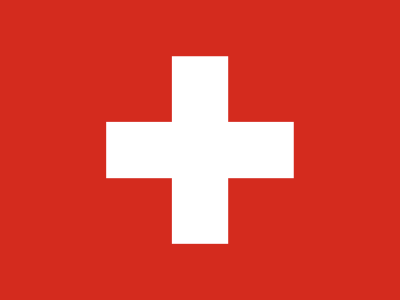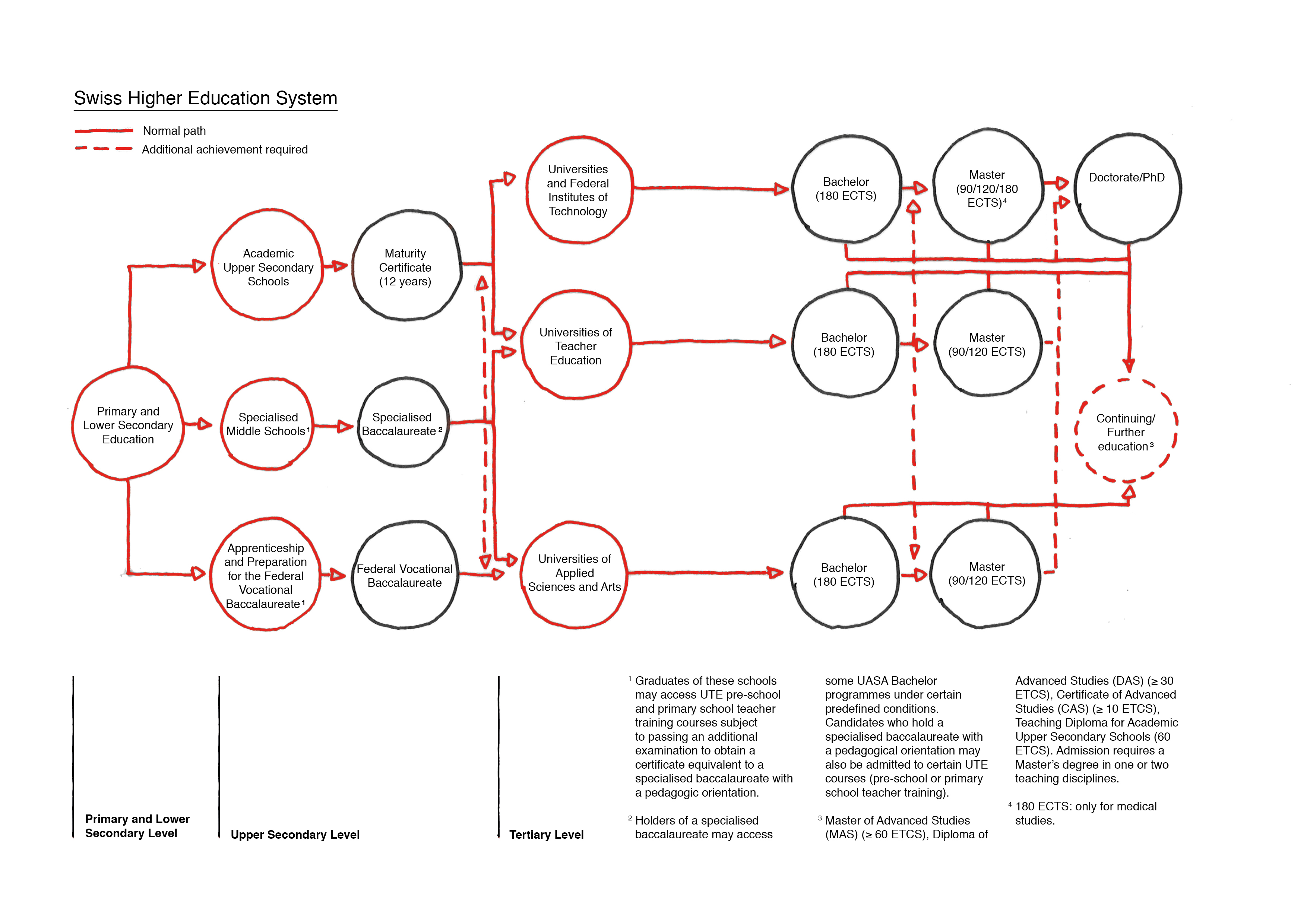
Switzerland
Last updated in 2024
Chapter 1: Higher Education System
Section 1.1.: Schematic Description of the Higher Education System
https://www.studyinswitzerland.plus/education-system/
Section 1.2: Description of Higher Education System
The Swiss higher education landscape is comprised of a diverse and comprehensive range of high-quality cantonal universities, federal institutes of technology, universities of applied sciences & arts and universities of teacher education. It follows the tiered study model of Bachelor’s and Master’s degrees. In addition, the cantonal universities and federal institutes of technology also award PhDs.
180 credits are assigned for a bachelor degree. This therefore takes three years of full-time study. A master’s degree is worth 90 or 120 credits and takes 1.5–2 years of full-time study.
Section 1.3: Number of Higher Education Institutions
The acutal list of accredited higher education institutions can be consulted under the following link:
accredited higher education institutions in Switzerland (swissuniversities)
Section 1.4 Number of Students in Higher Education
- General number of students: https://www.bfs.admin.ch/bfs/en/home/statistics/education-science/pupils-students/tertiary-higher-education-institutions.html
- Number of students divided by type of institution: https://www.bfs.admin.ch/bfs/en/home/statistics/education-science/pupils-students/tertiary-higher-education-institutions.html
- Number of foreign students enrolled in full degree programmes: https://www.bfs.admin.ch/bfs/en/home/statistics/education-science/pupils-students/tertiary-higher-education-institutions.html (see also the tables available for download via this link)
- Number of outgoing exchange students with credit transfer: https://stat.movetia.ch/en/international/mobility/semp/ (Important note: This data only reflects the Swiss-European Mobility Programme (SEMP), other programmes and cooperations between HEIs are not reflected. Please make sure you choose the option “outgoing” to be shown.)
- Number of incoming exchange students with credit transfer: https://stat.movetia.ch/en/international/mobility/semp/ (Important note: This data only reflects the Swiss-European Mobility Programme (SEMP), other programmes and cooperations between HEIs are not reflected. Please make sure you choose the option “incoming” to be shown.)
Section 1.5: Structure of Academic Year
The academic year in Switzerland is split into two semesters (terms): autumn and spring. The autumn semester generally runs from week 37/38 to week 50/51 (universities of applies sciences: 3/4); the spring semester from week 8/9 to week 22-24.
Section 1.6: National Qualifications Framework (or Similar)
- generic descriptors
- admission criteria
- ECTS credits
- academic degrees

Section 1.7: Learning Outcomes in Higher Education
Learning outcomes are «can do statements», i.e. statements about what a person is expected to know, understand and/or be able to do at the end of a learning process. They are formulated by those in charge of the courses of study at the level of the individual study programme, module or lesson.
The national qualifications framework for universities with the generic Dublin descriptors for the bachelor’s, master’s and doctoral degree levels as well as continuing education (Certificate of Advanced Studies CAS, Diploma of Advanced Studies DAS, Master of Advanced Studies MAS) provide guidance for universities to describe their courses of study and to formulate learning outcomes.
Section 1.8: Admission Requirements to Higher Education
Switzerland does not have a centralised admission procedure. Each university is autonomous and sets its own admissions criteria.
Here is some general information on admission to universities:
- Admission to a bachelor programme: the main requirement is an upper secondary school-leaving certificate considered to be equivalent to the Swiss Matura/Maturité/Maturità. Most Swiss universities apply a numerus clausus policy in the fields of human and veterinary medicine, dentistry and chiropractic studies. Swiss universities of applied sciences and arts usually apply an aptitude test for several disciplines (e.g. arts, social sciences, health and sports).
- Admission to a master’s programme: the main requirement is a bachelor’s degree from an accredited university in a specific field of study.
- Admission to a doctoral programme: the main requirement is a master’s degree from an accredited university in a relevant field of study.
- Language requirements: good knowledge of the language of instruction is the prerequisite for successful studies.
Section 1.9: Grading System
The grading system lies within the responsibility of the respective higher education institution. Most of the Swiss higher education institutions apply a grading system with marks ranging from 1 to 6 (where 6 is the best and 1 the worst grade). A scale ranging from 1 to 10 is also used in a few cases.
See also chapter 4.4 of the Diploma Supplement scheme: Diploma Supplement (swissuniversities.ch)
Section 1.10: Tuition Fee System for International Students
At the Swiss public universities, tuition fees are relatively low.
Some universities charge slightly higher tuition fees for international students. For practically all universities, you may pay between CHF 500 and CHF 2,000 per semester. Note that there can be smaller additional fees: registration fee; examination fee; semester fee; fee for social and cultural institutions, university sports, use of library; fee for students association, etc.
See also the following link for more information: https://www.swissuniversities.ch/en/service/studying-in-switzerland/tuition-fees-1
Section 1.11: Graduation Requirements and/or Qualification Awarding Requirements
Not applicable.
Section 1.12: Relevant Current and Prospective Reforms in Higher Education
Not applicable.
Chapter 2: Quality Assurance in Higher Education
Section 2.1: Quality Assurance Body in Higher Education
Switzerland has one external quality assurance body, the Swiss Accreditation Council: http://akkreditierungsrat.ch/en/
There is a Swiss Agency for Accreditation and Quality Assurance (AAQ), which is under the authority of the Swiss Accreditation Council. The AAQ carries out institutional accreditation procedures in Swiss higher education institutions in accordance with the Federal Act on Funding and Coordination of the Higher Education Sector (HEdA). Accreditation procedures may also be carried out by other recognized agencies.
Furthermore, the Swiss law on medical and psychology professions assigns to the AAQ the role of accreditation body for training and advanced training in medicine and for advanced training in psychotherapy, but upon request from a university, another agency recognised by the Swiss Accreditation Council may also carry out said accreditation.
The AAQ has an international network and is entitled to conduct procedures in Germany and Austria. International evaluations are also carried out in some specific cases.
Section 2.2: Quality Assurance System
|
|
Study programme
|
Institution
|
Further explanation
|
|
Voluntary
|
X
|
|
|
|
Compulsory
|
|
X
|
|
|
Regularity
|
6-7 years
|
6-7 years
|
|
|
External
|
X
|
X
|
|
|
Internal
|
X
|
X
|
|
|
Further information: Compulsory = Institutional accreditation is a requirement for the right to use a reserved designation– in other words, institutional accreditation is mandatory if an institution wishes to call itself a “University”, “University of Applied Sciences & Arts” or “University of Teacher Education”. It is also a requirement for universities regulated by public law in order to be eligible for federal contributions.
|
|||
Section 2.3: Link Programme Authorisation with Quality Assurance
Programme accreditation pursuant to the Higher Education Act HEdA is voluntary. It may only be requested by higher education institutions that have institutional accreditation.
Here is the list of accredited institutions and programmes: https://akkreditierungsrat.ch/en/decisions/
Chapter 3: Credit System in Higher Education
Section 3.1: Description of Credit System
Switzerland uses the “European Credit Transfer and Accumulation System” (ECTS). It is designed to award credit points according to the achievement of learning outcomes.
The ECTS credit point system allows students to have their achievements easily recognized in other countries; it also assures a certain degree of comparability between diplomas at European level.
Section 3.2: Credit Transfer System(s)
ECTS.
Section 3.3: Additional Information
Students can be exempted from a course based on credits acquired elsewhere (another programme or institution) and on competencies acquired outside the formal learning context (validation of prior leaning) according to the rules of the respective higher education institutions.
Section 3.4: Application of Credit System in Higher Education Institutions Obligatory?
Yes.
Section 3.5: Number of Credits per Academic Year/Semester
60 credits are assigned to one year of full-time study.
Section 3.6: Number of Credits per Higher Education Cycle
- 180 credits are assigned for a bachelor degree.
- A master’s degree is worth 90 or 120 credits.
- Credits can be given for some curricular elements at PhD-level.
Section 3.7: Description of Credit Unit
One ECTS credit point equals on average between 25 and 30 hours (workload). 60 credits are assigned to one year of full-time study.
Section 3.8: Link between Learning Outcomes and Credits
Yes, ECTS credits are only awarded to students after the successful assessment of the achieved learning outcomes. Learning outcomes are assessed, for instance, by means of oral examinations, written examinations, papers or written assignments etc.
